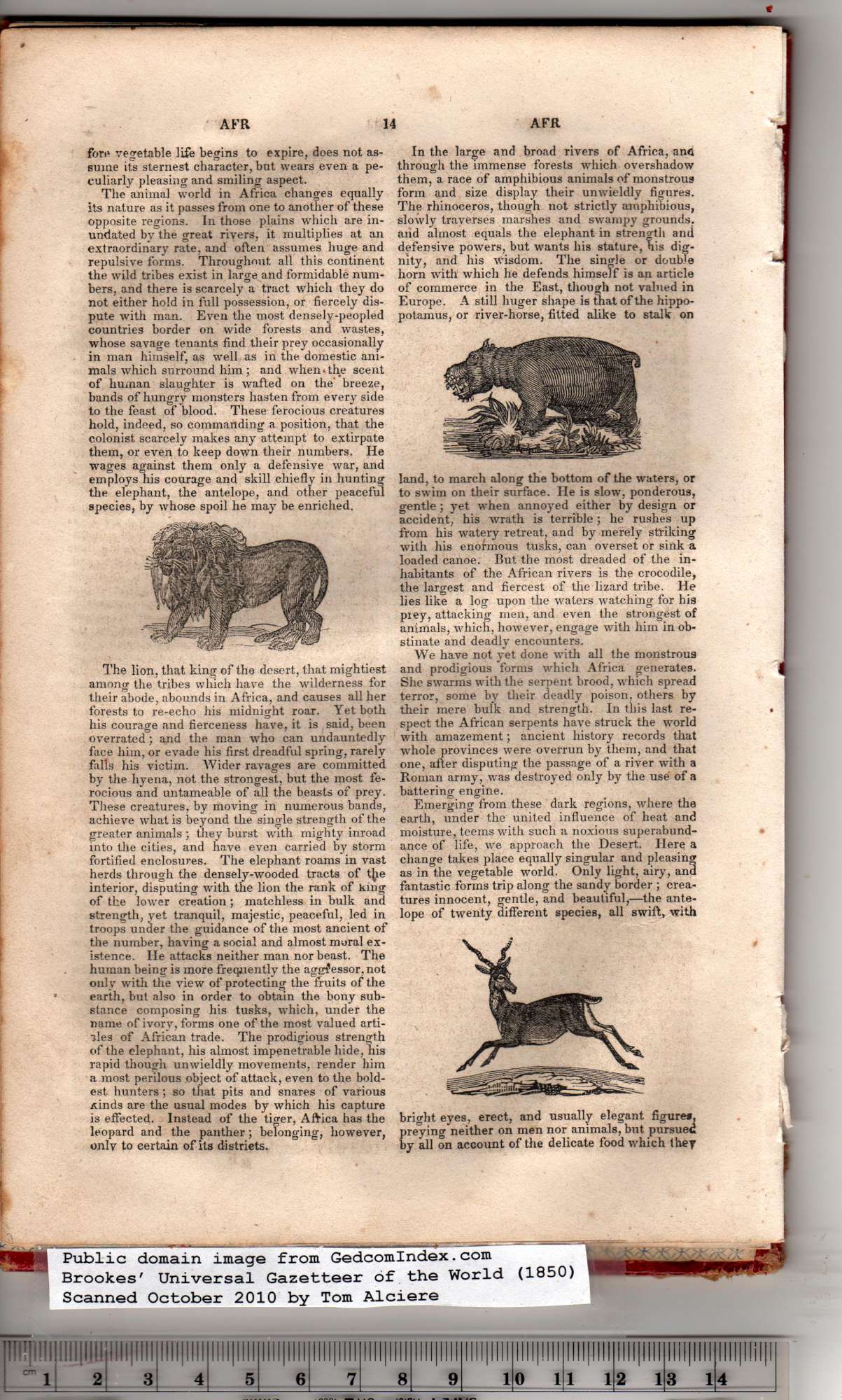|
fort* vegetable life begins to expire, does not as-
sume its sternest character, but wears even a pe-
culiarly pleasing and smiling aspect.
The animal world in Africa changes equally
its nature as it passes from one to another of these
opposite regions. In those plains which are in-
undated by the great rivers, it multiplies at an
extraordinary rate, and often assumes huge and
repulsive forms. Throughout all this continent
the wild tribes exist in large and formidable num-
bers, and there is scarcely a tract which they do
not either hold in full possession, or fiercely dis-
pute with man. Even the most densely-peopled
countries border on wide forests and wastes,
whose savage tenants find their prey occasionally
in man himself, as well as in the domestic ani-
mals which surround him ; and when * the scent
of human slaughter is wafted on the breeze,
bands of hungry monsters hasten from every side
to the feast of blood. These ferocious creatures
hold, indeed, so commanding a position, that the
colonist scarcely makes any attempt to extirpate
them, or even to keep down their numbers. He
wages against them only a defensive war, and
employs his courage and skill chiefly in hunting
the elephant, the antelope, and other peaceful
species, by whose spoil he may be enriched.
The lion, that king of the desert, that mightiest
among the tribes which have the wilderness for
their abode, abounds in Africa, and causes all her
forests to re-echo his midnight roar. Yet both
his courage and fierceness have, it is said, been
overrated; and the man who can undauntedly
face him, or evade his first dreadful spring, rarely
falls his victim. Wider ravages are committed
by the hyena, not the strongest, but the most fe-
rocious and untameable of all the beasts of prey.
These creatures, by moving in numerous bands,
achieve what is beyond the single strength of the
greater animals ; they burst with mighty inroad
into the cities, and have even carried by storm
fortified enclosures. The elephant roams in vast
herds through the densely-wooded tracts of tfie
interior, disputing with the lion the rank of king
of the lower creation ; matchless in bulk and
strength, vet tranquil, majestic, peaceful, led in
troops under the guidance of the most ancient of
the number, having a social and almost moral ex-
istence. He attacks neither man nor beast. The
human being is more frequently the aggressor, not
only with the view of protecting the fruits of the
earth, but also in order to obtain the bony sub-
stance composing his tusks, which, under the
name of ivory, forms one of the most valued arti-
cles of African trade. The prodigious strength
of the elephant, his almost impenetrable hide, his
rapid though unwieldly movements, render him
a most perilous object of attack, even to the bold-
est hunters ; so that pits and snares of various
Kinds are the usual modes by which his capture
is effected. Instead of the tiger, Africa has the
leopard and the panther; belonging, however,
onlv to certain of its districts.
bright eyes, erect, and usually elegant figure*,
preying neither on men nor animals, but pursued
by all on account of the delicate food which they
|
In the large and broad rivers of Africa, ana
through the immense forests which overshadow
them, a race of amphibious animals of monstrous
form and size display their unwieldly figures.
The rhinoceros, though not strictly amphibious,
slowly traverses marshes and swampy grounds,
and almost equals the elephant in strength and
defensive powers, but wants liis stature, his dig-
nity, and his wisdom. The single or double
horn with which he defends himself is an article
of commerce in the East, though not valued in
Europe. A still linger shape is that of the hippo-
potamus, or river-horse, fitted alike to stalk on
land, to march along the bottom of the waters, or
to swim on their surface. He is slow, ponderous,
gentle ; yet when annoyed either by design or
accident, his wrath is terrible; he rushes up
from his watery retreat, and by merely striking
with his enormous tusks, can overset or sink a
loaded canoe. But the most dreaded of the in-
habitants of the African rivers is the crocodile,
the largest and fiercest of the lizard tribe. He
lies like a log upon the waters watching for bis
piey, attacking men, and even the strongest of
animals, which, however, engage with him in ob-
stinate and deadly encounters.
We have not yet done with all the monstrous
and prodigious forms which Africa generates.
She swarms with the serpent brood, which spread
terror, some by their deadly poison, others by
their mere bulk and strength. In this last re-
spect the African serpents have struck the world
with amazement; ancient history records that
whole provinces were overrun by them, and that
one, after disputing the passage of a river with a
Roman army, was destroyed only by the use of a
battering engine.
Emerging from these dark regions, where the
earth, under the united influence of heat and
moisture, teems with such a noxious superabund-
ance of life, we approach the Desert. Here a
change takes place equally singular and pleasing
as in the vegetable world. Only light, airy, and
fantastic forms trip along the sandy border ; crea-
tures innocent, gentle, and beautiful,xe2x80x94the ante-
lope of twenty different species, all swift, with |
